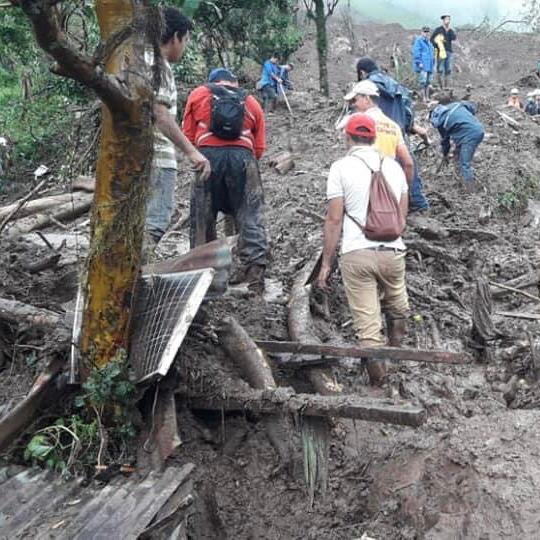 |
| Rescue workers search for survivors in mudslide in Peñas Blancas where 9 were killed. Photo: Radio la Primerisima |
Nicaragua has been battered by two hurricanes in two weeks. On November 3rd, Hurricane Eta hit as a Category 4, then on November 16th Hurricane Iota, the strongest storm ever to hit Nicaragua, made landfall as a Category 5 just a few miles from where Eta had made landfall. While Eta was a strong storm with lots of wind and rain, it moved westward across the country more slowly, dropping its rain over several days before heading northward through Honduras and Guatemala, then east to Cuba and Florida. In Nicaragua, two miners were killed in a landslide just before Eta hit, but there were more than 20 deaths in Honduras and more than 150 in Guatemala.
 |
| Lucas analyzing downed tree - just missed the office building! |
This tiny country has been dealt a catastrophic blow with these hurricanes: Iota caused 18 deaths, many of them babies and children. Eta damaged 10,000 homes, and we don’t yet have the count of homes damaged from Iota. Eighty-one health centers have been damaged, three bridges have been completely destroyed and there are hundreds of millions of dollars in damage to infrastructure. Devastatingly, not only cash crops but also food crops have been lost around the country, threatening Nicaragua’s hard-won food security.
 |
| Authorities evacuated 71,000 people in anticipation of Hurricane Iota. Photo: JP+ |
There is good news, too: the Nicaraguan government has responded swiftly to these storms to save lives. Throughout the country 103,200 first-responders were mobilized and worked well before the hurricanes even made landfall to evacuate people in vulnerable areas. In total, 160,000 people were evacuated to 3,700 emergency shelters where they were fed and given medical care. As many of these people begin to return home, there is a huge ongoing need for food, clothing, hygiene supplies, and household supplies. Although the will of the government is to help victims as quickly as they can – they had already sent roofing materials for 14,000 homes to affected areas before Iota hit – the rebuilding task ahead of the county is monumental, and the government’s small budget won’t stretch to accommodate all the urgent needs.
A call for climate justice: on November 15th as the region was preparing for Hurricane Iota, the Central American Presidents met virtually, demanding that developed countries not only drastically reduce their emissions but also pay reparations to countries who are suffering the consequences of the climate crisis for which they are the least responsible. Nicaragua’s carbon emissions are just 0.02% of the world total, yet this small country is bearing the brunt of the climate crisis right now. It is clear that these storms are a result of climate change – warming oceans create conditions for more storms forming, Iota was the record-breaking 30th such storm this year, and there are two more possible storms forming right now. For more than a decade Nicaragua – which now produces 74% of its electricity renewably – has been advocating for climate justice, emphasizing that climate financing must take into account not only funding for mitigation and adaptation but also reparations.
How are folks we work with faring? All our staff and their families are fine. Nueva Vida Clinic operations have continued as usual. Trees down and roof leaks are the norm. Paul and Becca had to hike into their home because of trees down on the only entrance "road". All of your emails and messages of concern are greatly appreciated. Please share this update with others, as we may not manage to reply to everyone individually.
Organic farming families with COPROEXNIC are fine; so far their sesame in the fields is fine. Rogelio reports that some of the co-op’s 140 acres of sesame near our Center is leaning over, but not bent or broken – phew! It should recover just fine. Peanut farmers are still worried about their crop molding, because too much rain can be very bad for peanuts.
The El Porvenir coffee cooperative reports that everyone is okay. Many of the 56 families’ houses lost their roofs with Iota, but they are able to repair with materials they have. The roof came off the coffee processing building, which will have to be repaired quickly before the machinery is damaged. All of their bean crop for food has been lost, as has their small organic sesame cash crop. Their organic coffee, nearly ready for harvest, has been partially damaged but so far the harvest is still looking okay. For those with fond memories of it, Inés also reports that the latrine that our groups always use when we visit the co-op was blown over.
What are we doing? In the immediate term, we are sending donated clothing to folks in emergency shelters – Monday we are tying sacks of it onto the roof of a bus going to the Caribbean coast - 18 hours overland to Bilwi, crossing the River Wawa in dugout canoes. Our local Rotary Club is raising funds for farmers to re-plant beans in areas where it's possible to still harvest a 90 day crop. We are working with other folks to see not only what is most urgently needed, but what support will be needed in the coming months and years, and will channel hurricane relief donations into those areas.
Please keep Nicaragua in your hearts. If you can help, send your donations here, designating as you wish: https://donatenow.networkforgood.org/jhc-cdca
- Becca